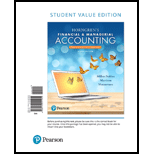
Trading Debt Investments:
Trading debt investments are the investments in debt securities where the investors wish to sell these investments at a short notice like in a few days, week, or months to generate some profit out of it. They are treated as current assets.
Available-for-sale debt investments:
Available-for-sale debt investments are the investments in debt securities, which are neither referred as trading debt investments nor referred to as held-to-maturity debt investments. The investors do not wish to hold them till maturity, and hence reported either as current assets or as long-term assets in the
Fair value:
Fair value refers to the price of the securities in the market, if the company has decided to sell the securities.
Unrealized-gain or Unrealized-loss:
Unrealized-holding gain or loss occurs when the investor company record the investments at its fair value, in its financial statements, without disposing (selling) them. When the cost of the investment is lesser than the fair value of the investment, then it is unrealized-gain. On the contrary, when the cost of the investment is greater than the fair value of the investment, then it is unrealized-loss.
To discuss: The adjustment that must be made at the end of the period for trading debt investments, and available-for-sale debt investments.
Want to see the full answer?
Check out a sample textbook solution
Chapter 10 Solutions
Horngren's Financial & Managerial Accounting, The Financial Chapters, Student Value Edition (6th Edition)

 AccountingAccountingISBN:9781337272094Author:WARREN, Carl S., Reeve, James M., Duchac, Jonathan E.Publisher:Cengage Learning,
AccountingAccountingISBN:9781337272094Author:WARREN, Carl S., Reeve, James M., Duchac, Jonathan E.Publisher:Cengage Learning, Accounting Information SystemsAccountingISBN:9781337619202Author:Hall, James A.Publisher:Cengage Learning,
Accounting Information SystemsAccountingISBN:9781337619202Author:Hall, James A.Publisher:Cengage Learning, Horngren's Cost Accounting: A Managerial Emphasis...AccountingISBN:9780134475585Author:Srikant M. Datar, Madhav V. RajanPublisher:PEARSON
Horngren's Cost Accounting: A Managerial Emphasis...AccountingISBN:9780134475585Author:Srikant M. Datar, Madhav V. RajanPublisher:PEARSON Intermediate AccountingAccountingISBN:9781259722660Author:J. David Spiceland, Mark W. Nelson, Wayne M ThomasPublisher:McGraw-Hill Education
Intermediate AccountingAccountingISBN:9781259722660Author:J. David Spiceland, Mark W. Nelson, Wayne M ThomasPublisher:McGraw-Hill Education Financial and Managerial AccountingAccountingISBN:9781259726705Author:John J Wild, Ken W. Shaw, Barbara Chiappetta Fundamental Accounting PrinciplesPublisher:McGraw-Hill Education
Financial and Managerial AccountingAccountingISBN:9781259726705Author:John J Wild, Ken W. Shaw, Barbara Chiappetta Fundamental Accounting PrinciplesPublisher:McGraw-Hill Education





